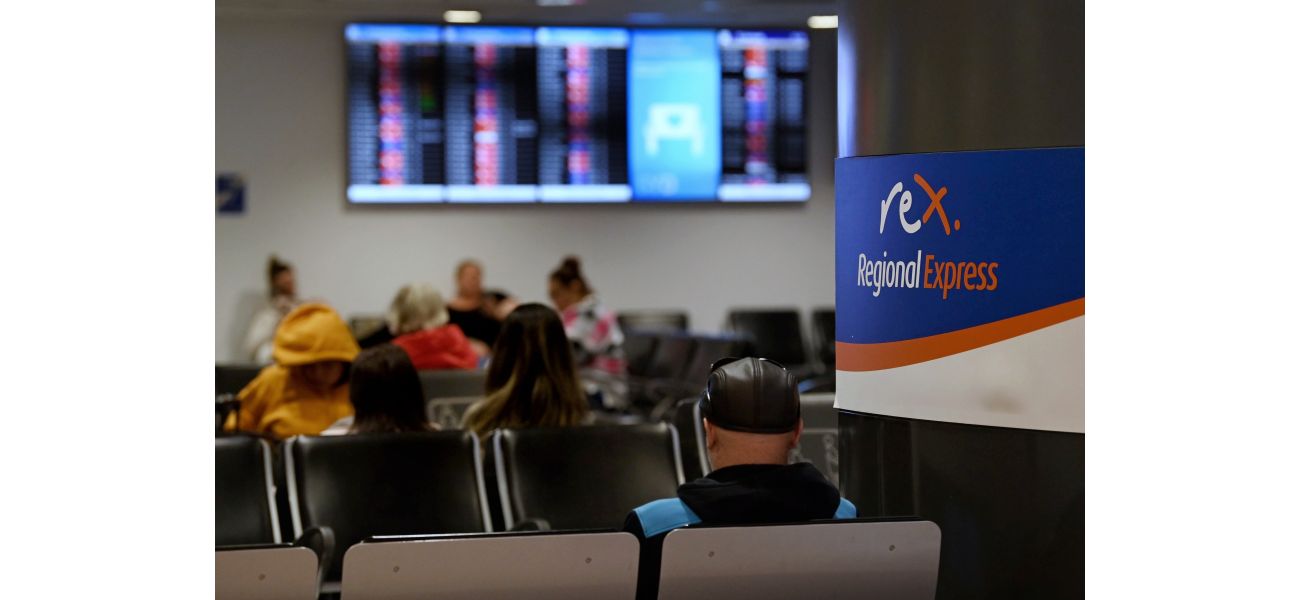Australian travelers are paying almost double the price for domestic flights since the collapse of Rex airlines.
Airfares from Adelaide to Melbourne have increased by 95% to an average of $296.
November 12th 2024.

It has been reported by the ACCC that Australian travellers are facing significantly higher costs for domestic air travel following the collapse of regional airline Rex. The airline went into voluntary administration in July 2024, leading to a spike in ticket prices for major city routes and limiting options for customers.
The ACCC has linked the rise in airfares to Rex's decision to stop offering budget flights between cities such as Adelaide, Melbourne, the Gold Coast, and Canberra. According to their findings, the average revenue per passenger on these routes has increased by 13.3% since September 2024.
Commissioner Anna Brakey of the ACCC stated that this increase in prices can be attributed to a decrease in competition in the domestic airline sector, as Rex's departure left only two major airlines servicing 98% of domestic passengers in Australia. She also noted that the usual seasonal peak in air travel during September was compounded by the loss of lower fares offered by Rex and a decrease in airline seating capacity.
The impact of Rex's exit has been felt on several routes that the airline once operated. For example, airfares between Adelaide and Melbourne have risen by a staggering 95%, with an average cost of $296. Similarly, flights from Melbourne to the Gold Coast have gone up by 70% to $432, and Canberra to Melbourne has seen a 54% increase to $298.
To put this in perspective, research from Flight Centre's FCM Travel and Corporate Traveller has found that the average cost of international economy flights has actually decreased by 5-10% in the past year. This stark difference highlights the impact of Rex's collapse on domestic air travel.
In response to the ACCC report, Qantas domestic chief executive Markus Svensson stated that the data used does not accurately reflect the average fares paid by customers. He explained that the data only shows the lowest fares available on a particular day, and does not take into account other factors that may influence demand and prices.
Svensson also acknowledged that airfares have increased in line with inflation, and that the decrease in capacity due to the collapse of Bonza and Rex has resulted in fewer lower fares being available. However, he reassured customers that Qantas is looking into adding more capacity where possible.
It is worth noting that the federal government has announced an $80 million lifeline for Rex to continue operating, with the aim of providing critical services for regional communities. The ACCC's report also raises concerns about the long-term impacts of Rex's exit on the domestic aviation sector, and the potential barriers to entry for new airlines due to fleet supply chain issues and shortages of pilots and engineers.
The ACCC has linked the rise in airfares to Rex's decision to stop offering budget flights between cities such as Adelaide, Melbourne, the Gold Coast, and Canberra. According to their findings, the average revenue per passenger on these routes has increased by 13.3% since September 2024.
Commissioner Anna Brakey of the ACCC stated that this increase in prices can be attributed to a decrease in competition in the domestic airline sector, as Rex's departure left only two major airlines servicing 98% of domestic passengers in Australia. She also noted that the usual seasonal peak in air travel during September was compounded by the loss of lower fares offered by Rex and a decrease in airline seating capacity.
The impact of Rex's exit has been felt on several routes that the airline once operated. For example, airfares between Adelaide and Melbourne have risen by a staggering 95%, with an average cost of $296. Similarly, flights from Melbourne to the Gold Coast have gone up by 70% to $432, and Canberra to Melbourne has seen a 54% increase to $298.
To put this in perspective, research from Flight Centre's FCM Travel and Corporate Traveller has found that the average cost of international economy flights has actually decreased by 5-10% in the past year. This stark difference highlights the impact of Rex's collapse on domestic air travel.
In response to the ACCC report, Qantas domestic chief executive Markus Svensson stated that the data used does not accurately reflect the average fares paid by customers. He explained that the data only shows the lowest fares available on a particular day, and does not take into account other factors that may influence demand and prices.
Svensson also acknowledged that airfares have increased in line with inflation, and that the decrease in capacity due to the collapse of Bonza and Rex has resulted in fewer lower fares being available. However, he reassured customers that Qantas is looking into adding more capacity where possible.
It is worth noting that the federal government has announced an $80 million lifeline for Rex to continue operating, with the aim of providing critical services for regional communities. The ACCC's report also raises concerns about the long-term impacts of Rex's exit on the domestic aviation sector, and the potential barriers to entry for new airlines due to fleet supply chain issues and shortages of pilots and engineers.
[This article has been trending online recently and has been generated with AI. Your feed is customized.]
[Generative AI is experimental.]
0
0
Submit Comment





